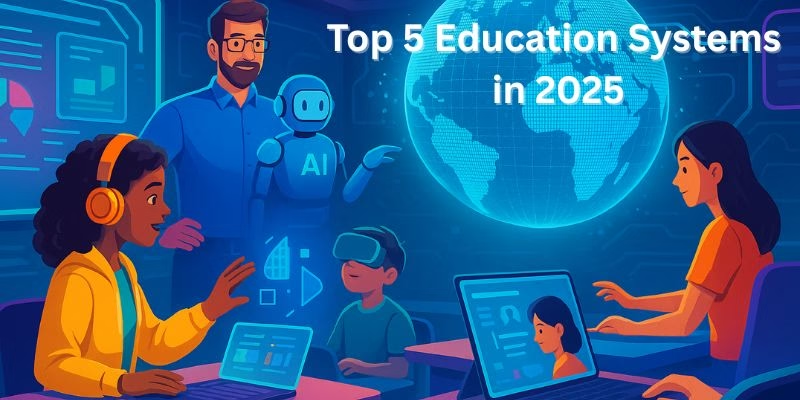The world’s leading education systems in 2025 are evolving rapidly to meet the demands of a complex future. Blending artificial intelligence, cultural knowledge, climate resilience, and inclusive learning, several nations have taken significant steps to future-proof their students. In this blog, we explore the Top 5 Education Systems in 2025, based on innovation, equity, teacher empowerment, and digital integration.
New Global Education Metrics (2025 Update)

We reference next-generation evaluation metrics:
- AI-Readiness Index (Use of AI in classrooms)
- Equity Gap Score (Urban vs. rural learning access)
- Teacher Innovation Index
- Green Skills Integration
Let’s look at the top performers making global headlines in 2025.
1. Finland – “Teacher 4.0” and AI Co-Teaching
Innovation Highlight: Human-AI collaborative classrooms
Finland continues to lead with its forward-thinking education system. In 2025, over 90% of classrooms have adopted AI co-teachers, improving both student outcomes and teacher support. Programs like “Neurodiversity Hours,” using non-invasive brainwave monitors, help personalize learning and reduce anxiety.
Why It Ranks High:
- 40% reduction in student stress since 2022 (Helsinki EdTech Report)
- Strong emphasis on emotional well-being and adaptive learning
- Progressive teacher training in emerging technologies
2. Canada – Indigenous Knowledge Meets STEM
Innovation Highlight: Indigenous-led tech curriculum
Canada’s 2025 reforms focus on decolonizing education by integrating Indigenous perspectives with modern STEM subjects. In provinces like Nunavut and Alberta, elders contribute to curriculum design, and students explore Arctic-based machine learning.
Why It Ranks High:
- Bilingual coding camps in Cree and Inuktitut
- Culturally rooted AI and data ethics
- National support for land-based learning and tech education
3. South Korea – Redefining Academic Pressure
Innovation Highlight: Student resilience and tech incubators
South Korea, once known for intense academic pressure, has embraced a more balanced model in 2025. With new programs such as resilience-building robots and student startup labs, it has shifted from rote memorization to innovation-focused learning.
Why It Ranks High:
- AI tutors and emotional health tools in 80% of schools
- Mandatory entrepreneurship units in secondary education
- Significant rise in student-led innovations and startups
4. Estonia – Digital Natives from Day One
Innovation Highlight: Web3 and early digital citizenship
Estonia’s education system prepares students for a fully digital society. Children as young as six learn about blockchain technology and digital responsibility through gamified platforms. Virtual reality tools support citizenship education and global awareness.
Why It Ranks High:
- National e-ID system introduced in schools
- Early exposure to cybersecurity and blockchain basics
- Strong government investment in digital literacy programs
5. New Zealand – Climate-Responsive Curriculum
Innovation Highlight: Sustainability as a core subject
In 2025, New Zealand’s schools are teaching climate adaptation alongside core academics. Programs focus on environmental science, disaster preparedness, and sustainable living. Some schools in high-risk zones have dual roles as community shelters.
Why It Ranks High:
- Curriculum includes carbon accounting and renewable energy
- Eco-conscious projects led by students
- Recognized by UNICEF for global influence in climate education
India’s Remarkable Leap in 2025
While not in the global top 5, India has made notable progress in 2025. Several Indian states are reshaping digital learning in India through localized, scalable models. Here are three standouts:

Top 3 Digital-First Indian States (2025)
1. Kerala
- 94% of government schools using AI tools through “Little KITEs”
- Blockchain-based digital certificates for students
- “Cyber Gandhi” project offers solar-powered tablets in tribal regions
2. Delhi
- 100% of schools with 5G-enabled smart classrooms
- “Digital Rickshaw” mobile labs serve underserved communities
- Quantum computing pilot program launched with IIT Delhi
3. Karnataka
- “AI for All” initiative trains students in Grades 8–12
- Collaborations with tech companies for AR textbooks in Kannada and English
- Dual-language coding education in Kannada and Python
Key Metrics Comparison (NITI Aayog 2025 EdTech Survey):
| State | AI Tutor Coverage | Vernacular Digital Content | Avg. Digital Attendance |
|---|---|---|---|
| Kerala | 82% | Malayalam (100%) | 94% |
| Delhi | 78% | Hindi/English (100%) | 89% |
| Karnataka | 68% | Kannada (92%) | 83% |
Final Thoughts
The Top 5 Education Systems in 2025 are those that balance innovation with inclusion. From AI-powered classrooms in Finland to culturally rich coding in Canada and climate-based education in New Zealand, these countries are not just preparing students for jobs—they are preparing them for life.
India’s progress demonstrates that emerging economies can also lead with scalable, tech-enabled learning. As more nations adapt, the future of global education looks promising.
Also Read Best Job Interview Tips to Impress Recruiters in 2025 (Win the Job!)








